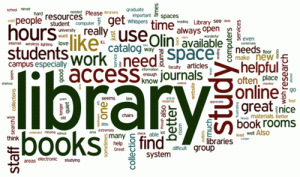 An ongoing challenge of our profession is keeping up with what is happening in technology and education and how they combine to transform teaching and learning. It’s daunting for all of us, but you don’t have to do it alone. Connect to the leaders and quickly identify the trends most likely to impact you and your students. Use this knowledge to determine what and how you will incorporate into your program.
An ongoing challenge of our profession is keeping up with what is happening in technology and education and how they combine to transform teaching and learning. It’s daunting for all of us, but you don’t have to do it alone. Connect to the leaders and quickly identify the trends most likely to impact you and your students. Use this knowledge to determine what and how you will incorporate into your program.
Who are the leaders? It depends on what you are talking about. No one knows everything about school librarianship let alone is an expert in all its facets so you may need more than one.
The easiest place to start is your state association’s listserv. Identify the librarians posting valuable information. What is their strength? Technology? Literacy? Global and digital citizenship? Instruction design?
When these leaders give links to information or answer a question someone posed, bookmark or save it to appropriate folders. You rarely are going to use it immediately, but if you haven’t saved it you won’t be able to find it when you do need it.
Bloggers are another great source for finding information from leaders. My favorites, in alphabetical order, are:
Buffy Hamilton – The Unquiet Librarian – https://theunquietlibrarian.wordpress.com/ – Currently the librarian at Norcross High School in Gwinnett County (GA), her specialty areas include critical literacy, participatory learning and culture, ethnographic studies, critical pedagogy, and writing literacies. Although she brings tremendous erudition to her blog, everything connects to what she is doing with her students. Most recent posts are: Formative Assessments: Our Compass for Understanding Affective, Cognitive, and Physical Aspects of Information Search Processes and Write-Around + See-Think-Wonder + Gallery Walk-Big Group Share=Art Students’ Awesomeness. (Don’t be put off by the title of the first example. Check the post). (Also @buffyjhamilton)
Doug Johnson – Blue Skunk Blog – http://doug-johnson.squarespace.com – He is the Burnsville-Eagan-Savage (MN) Public Schools Director of Technology with a background in teaching K-12. He brings his technology strength and his perspective as an administrator to his blog. Recent posts include: “Why technology is resisted” and “BFTP: What is an authentic question?” (Also @blueskunkblog )
 Jennifer LaGarde (aka Library Girl) http://www.librarygirl.net/ – She is Lead School Library Media Coordinator/Digital Teaching and Learning Specialist for New Hanover County Schools in Wilmington, NC Her blog is filled with inspiring ideas to motivate reading. Among her recent posts are: Your Students Need A Reading Champion | Giving Yourself Permission To Read and Learning To Read Alone Is Not Enough. Your Students Need A Reading Champion. (Also Library Girl @jenniferlagarde)
Jennifer LaGarde (aka Library Girl) http://www.librarygirl.net/ – She is Lead School Library Media Coordinator/Digital Teaching and Learning Specialist for New Hanover County Schools in Wilmington, NC Her blog is filled with inspiring ideas to motivate reading. Among her recent posts are: Your Students Need A Reading Champion | Giving Yourself Permission To Read and Learning To Read Alone Is Not Enough. Your Students Need A Reading Champion. (Also Library Girl @jenniferlagarde)
Joyce Valenza http://blogs.slj.com/neverendingsearch/ – Currently at Rutgers School of Communication & Information but, she has a long history as a school librarian and is responsible for #TLChat, TLChat Live, and TL Virtual Café. She has several fields of expertise including social media, unconferences and global participatory culture. Among her recent blog posts are: several where she brings great ideas from other sources and PopBoardz: a media dashboard for instruction and presentation and How to host a hackathon (on the #sljhackathon breakfast) (Also @joycevalenza)
Specifically on Twitter, follow Shannon Miller (TLChat) @shannonmiller and Elissa Malespina @elissamalesphin (TL News Night Live Cohost). Shannon has great global project ideas and Elissa is knowledgeable about augmented reality.
When you attend conferences, (as I suggested in last week’s blog) get the contact information of those who presented what you considered to be great possibilities for your library program. This way you can follow up with questions. They will help you.
And finally, you can also join my School Librarian’s Workshop Facebook group for regular posts from me and others about issues in school librarianship, ideas to share with teachers, or what might be next in technology. On Saturday, I posted something about the possible impact of wearable technology on education.
By picking and choosing what interests you, you can learn quickly what is out there, and make contact with those who can help you, When you bring it to your students and teachers, you are being a leader and making yourself indispensable.








